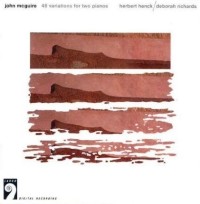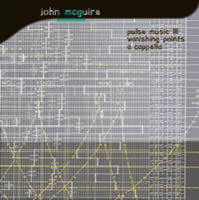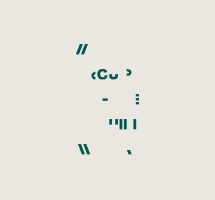An American?
|
Dan Albertson [March 2016.] [For you, Jakkrit Bunmee, with thanks for your positivity and the hope that your geographical shift will bring even more delights.] John McGUIRE (b. 1942):
48 Variations for 2 Pianos (1976-80). Herbert Henck & Deborah Richards (pf). Largo Records 5108 (O/P). Pulse Music III (1978); Vanishing Points (1985-88); A Cappella (1990-97)*. Beth Griffith (S)*. Sargasso Records SCD28043 (http://www.sargasso.com/). Cadence Music (1982-85)1; Exchanges (1998-2002)2; Decay (1967-70)3; Frieze for 4 Pianos (1969-74)4; Music for Horns, Pianos and Cymbals (1981)5. Julia Rempe (S)2; Christine Chapman (hn)3; Paulo Álvares, Eun Ju Kim, Hermann Kretzschmar, Irmela Roelcke (pf)4; Pellegrini-Quartett2; Ensemble Modern1, musikFabrik5, James Avery5 & Ernest Bour1 (cond.). edition rz RZ 20003-4 (http://www.edition-rz.de/).
Preface: A Subset of Typologies in Contemporary American Music (1) awful neo-Romantics; (2) woeful post-minimalists and/or failed rock musicians; (3) empty, but bright and ebullient, neo-Rimsky-Korsakovites; (4) a large, and dull, brigade of younger composers still grappling with Grisey and Lachenmann; (5) a small faction of modernists, many of whom have taken on postmodern tendencies; (6) the usual outliers exploring improvisation, microtonality and other niches. * * * Any regular reader will know that American music seldom features in my missives, not least due to the six reasons above. A certain Pulitzer Prize-winning composer has told me more than once, “Why don’t you ever do anything for American music, Dan?” To answer this question, and not out of a sense of duty but rather pleasure, I give this tract over to John McGuire, whom I am absolutely certain is not who the aforementioned composer had in mind. He fits into no category, lacks acolytes and eschews publicity. McGuire appeals on a personal level, since he has a solid education, starting with Ingolf Dahl and Seymour Shifrin, then proceeding to Krzysztof Penderecki and Karlheinz Stockhausen. He lived in Germany for more than three decades. The fact that he toils for long periods on works for small forces also sets him apart. Indeed, his catalogue has only 18 pieces in it, despite having works dating back to 1963. McGuire’s music intrigues on a different level, as an alternative to silly Reichian pulse-based minimalism. His music often has a pulse, for sure, and he has three works entitled Pulse Music, but its harmonic language is rich and varied: Rhythm is at the fore, but not at the expense of other parameters. Discographic evidence is sparse. The first one that I heard was 48 Variations for 2 Pianos, briefly on disc around the turn of the millennium. It is an understated sequence operating far beyond ideas of the bravura or concertante. His portrait CD on Sargasso Records from a few years later has also disappeared. All three works here, plus or minus 25 mins. apiece, are for fixed media, to which A Cappella adds the voice of McGuire’s wife Beth Griffith. Electronic music, a resource that will never vary in “performance,” intrinsically poses problems, but the steadiness of McGuire’s music somehow seems apposite. The most substantial offering in recorded form is the double-disc set on edition rz. It gives an overview of 35 years of McGuire’s output, from his breakthrough Decay for eight horns, here overdubbed and a work without a forbear, to Exchanges for soprano and string quartet. Frieze for 4 Pianos delights in its cold machination, while the shorter Music for Horns, Pianos and Cymbals combines staggered patterns for four horns and two pianos with constant interjections from cymbals. Most striking is Cadence Music, led by Ernest Bour, no less, showing the ease with which McGuire can handle 21 players, forces almost unprecedented in his extant works. John McGuire is proof that music in the late 20th century and early 21st century may be simple without teetering into asininity. May others take notice!
[At this writing the Largo disc is available at Berkshire Record Outlet. You may need to search for the pianists and not for the composer to actually find it. Grant covered the Sargasso disc in this roundup.] [More Dan Albertson]
[More
McGuire]
[Previous Article:
Henze, Abrahamsen and Tsontakis with the BSO]
[Next Article:
Feldman's SQ2 in Boston]
|


